- Home
- Alice Hoffman
Seventh Heaven Page 6
Seventh Heaven Read online
Page 6
“It’s jammed,” Hennessy said—shouted, really—and Nora turned to him, startled. She wasn’t quite as young as he’d thought, but her eyes were blacker than he could believe.
Hennessy reached down and turned off the mower.
“The grass is caked up,” he told her, and then for some reason he felt foolish. He reached down and pulled out some of the clippings that were stuck between the blades. The boy leaned against his rake and watched; the baby pulled himself up by the rim of his playpen.
“There you go,” Hennessy said. He stood up and clapped his hands together, but he couldn’t get the grass off his sweaty palms. “That should do it.”
“Well, gee,” Nora said. She could feel her heart beating too fast. She reached up and fluffed out her bangs and wished she didn’t have her hair pulled back in a ponytail. She tried to look away from Hennessy but couldn’t; it was almost as if she had to look at him, as if something would break if she looked away. “Thanks a million,” she said.
“You should get your husband to spring for a new mower,” Hennessy said.
“A new mower,” Nora said, considering.
“Who’s lazy?” the boy said.
“What?” Hennessy said.
“Really, thanks a million,” Nora said. “It’s great to have neighbors.”
“Yeah,” Hennessy said.
The baby in the playpen was reaching up his arms and crowing. Nora managed to look away from Hennessy; she went over and picked James up, then balanced him on her hip. Across the street, Stevie had come outside to shout that if his father didn’t come home for supper right now they’d be late for Little League.
“It’s the last week of baseball,” Hennessy explained. “That’s my boy. First base.”
“Nice boy,” Nora said. She came over and put one hand on Billy’s shoulder. “I’ll bet you kids will really hit it off,” she said hopefully.
Billy looked up at her as if she were crazy. Stevie had already begun to torment him in school; twice he’d stolen Billy’s lunch and thrown it in the trash, he’d called Billy jerkface and fink and laughed hysterically when Billy couldn’t climb the ropes in gym.
“That guy?” Billy said, incredulous. “You’ve got to be kidding.”
“Kids today,” Nora said as an apology to Hennessy. She gave Billy a little jab with the toe of one of her pumps. She had no idea why this neighbor of hers looked so good to her; he was tall, but he wasn’t even handsome, he didn’t have hypnotic eyes like Elvis, he didn’t have a great smile like Roger. Roger’s smile could drive you crazy, as if he knew what was inside of you. Maybe it was Hennessy’s hands that got to her; they were wide and strong. She looked at his fingers and wondered what his touch would feel like on her shoulders, on her thigh.
“Little League,” Nora said, thoughtfully.
The baby gave a wail and dove for Nora’s breasts, leaning his head into her shirt.
Jesus, Hennessy thought.
Nora quickly shifted the baby under her arm, but Hennessy had seen a flash of her skin.
“Billy would love Little League,” Nora said.
“Me?” Billy said.
I have to get out of here, Hennessy told himself.
“Sign-ups are in May,” Hennessy said, as he backed away toward the sidewalk.
“That’s good to know,” Nora called after him. “I’d love to meet your wife sometime.”
“Yeah,” Hennessy agreed.
“Well, I would,” Nora said to Billy when she saw the look on his face.
Hennessy waved and kept on, across the street. Nora studied his back and bit her lip. She simply refused to think about men.
“I told you people were nice here,” Nora said to Billy. She jiggled James under her arm and rolled the mower back into the garage. “This is going to be great,” she told Billy.
Nora went inside to fix macaroni and cheese; she always had trouble with casseroles: they came out too watery—you had to eat the noodles with a spoon—and sometimes she just threw the whole thing out and served Frosted Flakes or beef jerky on white bread. Billy picked up the rake and went to work gathering the cut grass. The rake was too tall for him, and it hurt his shoulders to use it, but Billy didn’t care. A few cars passed by, and although he heard them, he didn’t bother to look up. He was practicing the blackout trick, and he was getting pretty good at it; if you didn’t know better, you would swear a pair of jeans and a blue sweatshirt were raking the grass all on their own. If he worked really hard, gathering the grass into neat piles, then heaping armfuls into the silver garbage cans, he could make their house look just like everyone else’s. So he stayed out until dark, and while the other children on the block were finishing their dinners or playing ball or getting ready for bed, Billy Silk was still raking grass, and by then he had forgotten how much his shoulders hurt.
3
ALL SOULS
ON JAMES’S FIRST BIRTHDAY Nora was pleased to find that he still didn’t resemble anyone. There wasn’t a trace of any family lineage when you studied his face; it was as if he’d just appeared one October day, without heritage or past, born out of labor and light rather than genes. Like all October babies, he was a good sleeper and liked the cold. He’d pull off his woolen socks and throw off his blanket at night. He’d point at the window and wail until Nora let him sleep with it open, and then he’d quiet down right away and stare at the stars that formed an arch above their house. He still smiled easily and amused himself, and although he’d taken a few steps, he was in no great hurry to walk. Whenever he stumbled into Nora’s arms, she would think it wasn’t possible for her to love him any more than she did, and yet each day she did; she loved him so much that she discovered that her hands and feet had grown a little larger to make room inside her for all that she felt, and because of this she had to go out and buy new boots and gloves and have her high heels stretched by the shoemaker up on the Turnpike.
Nora loved to celebrate birthdays, but because James’s fell on a Saturday she didn’t have time to make a cake from scratch; she didn’t even have time for a mix, because Armand’s was so busy she wound up staying till four when she should have been home by two thirty. The only plus about working overtime and having to pay her baby-sitter an extra dollar fifty was that she had that many more customers to whom she could pass out invitations to Tupperware parties.
“I’m not so certain I like this,” Armand said when he got hold of an invitation. He had left one of his best customers teased but not combed out so he could talk to Nora privately, over by the sinks.
“Actually, it’s very classy,” Nora said, thankful that Armand had no idea she was also trying to sell her clients magazine subscriptions. “Salons in Manhattan have fashion shows. They give makeup demonstrations. I should bring my Tupperware right into the shop with me. I could start next week.”
Armand thought this over, and finally agreed to a ten percent cut of the profits. Since he’d have no real idea of what the profits were, Nora figured she would slip him a five and that would be that. And even if he found out she was stiffing him, he wouldn’t fire her. Nora was good for business. She wore her hair in a French twist and she’d let her nails grow exceptionally long and had found a new shade of polish that suited her—Roman Red—and women who’d never had manicures before asked for the same color. The customers were crazy about her; they rearranged their schedules so they could come to the shop on Saturdays. She had one client who came by bus all the way from East Meadow.
“The hand,” Nora always told her clients, “is the window into the soul.”
All right, she knew it was supposed to be the eyes, but what was the difference? She held her clients’ hands and commented on their cuticles and their skin tones. When she realized that she got bigger tips each time she gave advice on color coordination she stopped talking cuticles. She had a gift for telling a client which colors were right for her, whether shades in the orange family or the scarlet range were best, and she often suggested whole wardrobe changes. “No
gray for you,” she’d advise a washed-out client. “Purple,” she’d whisper to a housewife who was splurging on a manicure for the first time in ages.
On James’s birthday, she left Armand’s with her tip money folded into an envelope in the pocket of her black car coat. Snips of hair stuck to her sleeves and to the soles of her shoes. She took the bobby pins out of her French twist and shook out her hair as soon as she was out of sight of the beauty parlor, then ran her fingers through her loose hair as she rushed into the A&P. She quickly found what she needed for James’s birthday and headed for the front of the checkout line.
“You don’t mind taking me first, do you?” she asked the checker, a sweet-faced blonde named Cathy Corrigan, who was so startled by Nora’s request that she began to ring her up, even though there was a discontented line stretching over to the fruit bins.
“My baby’s birthday,” Nora announced to the checkout line. She held up a packet of blue-and-white-striped candles. “You did a good deed,” Nora told the checkout girl as she bagged the four packages of Twinkies.
Nora raced home in the Volkswagen, parked, and grabbed the grocery bag. She still loved coming home; she loved the way her high heels sank into the grass as she cut across the lawn, and the sound of crumpled leaves on the front stoop and the way her hand felt on the unlocked door just before she opened it. Rickie Shapiro had put on one of Nora’s Elvis records, and even though it sounded scratchy, Nora turned up the volume when she got inside the house. As she hung up her coat, she admired the closet space. She found James in the kitchen, stacking blocks on the floor. Rickie was at the table, singing along with Elvis and painting her nails pink.
“Birthday boy!” Nora said. She picked James up and gave him a big kiss. “How were they?” she asked Rickie.
“Fine,” Rickie said. “Except Billy wouldn’t come out of his room.”
Well, that was nothing new, so Nora put James down, and he clung to her leg while she unwrapped the Twinkies and arranged them on a plate.
“Wrong color,” Nora said over her shoulder to Rickie.
“Pink is my color,” Rickie said with confidence.
“Okay,” Nora said. “Sure. If that’s what you want to think.”
Rickie blew on her nails so they would dry faster, while Nora got her purse and paid Rickie the six dollars she owed her.
“Pink looks great on me,” Rickie said.
“Red,” Nora told her. She went to the doorway of the kitchen. “Billy! We’re having James’s birthday.”
“You’ve got to be kidding,” Rickie said. “My mother wouldn’t allow me to wear red. Not with my hair.”
“Red is your color,” Nora said. “Take it or leave it. You know, you really should stop setting your hair. Just wash it and let it dry naturally.”
“And let it frizz up!” Rickie said. “Not on your life.”
“All right,” Nora said. She was poking candles into the Twinkies. “Fine. If you want to look like everyone else, instead of going with your natural beauty, that’s your choice. Did James have his bottle?”
“Yeah,” Rickie said. Her nails were dry enough for her to put on her coat. She tossed the bottle of pink nail polish into her purse, but when she looked at her nails the color looked weaker than she’d expected. That was what she hated about sitting for Nora Silk’s kids: she always left confused. She didn’t even know why she came back; she didn’t need the money that badly. The baby was cute, but Billy could drive you crazy. Some weeks he’d want to play Monopoly for three hours straight and other days he wouldn’t even talk to her. He’d stay in his room, wrapped in an old blanket, eating pretzels and potato chips and looking so mad Rickie didn’t dare to speak to him. Sometimes she thought she could hear him grinding his teeth through the closed door.
She needed this like a hole in the head. She had always had everything she ever wanted, and, frankly, she felt awful about it sometimes. She developed a habit of giving people things, especially her best friend, Joan Campo, who had to work Saturdays and Sundays in her father’s deli. She had a new angora sweater she now decided she would give to Joan; it was seashell pink, and maybe Nora was right about her coloring, maybe she was more the crimson or scarlet type. If there was a problem that Rickie faced, it was simply that her father made more money than most of her friends’ fathers. He had a Cadillac Eldorado on order and he was always bringing home clothes from A&S; he even thought he might be able to get Rickie a job in the Junior Miss department next summer and she’d have her own ten-percent employees’ discount. Sometimes, especially when she was with Joan, Rickie didn’t think it was fair that good things just seemed to happen to her family. She had already been to Florida four times. She knew how to order room service and how to hike up her skirt to make her crinoline show, and that, Rickie knew, drove boys crazy. Everyone agreed that her brother was the smartest kid in the school and the best ballplayer in the town’s brief history. But they didn’t know that her mother, Gloria, spoke French, enough to order dinner in any good restaurant, and that she always wore nylons, even when she was vacuuming.
And still, Rickie kept on sitting for the Silk kids, even though Nora had none of the things Rickie valued in a woman as old as Nora—namely a husband and a decent house. Rickie certainly didn’t consider any house in the neighborhood decent; she had a split-level with a pool and a fireplace in mind. By the time she was Nora’s age she planned to have not only a husband and a house in Cedarhurst or Great Neck, but also two little girls, whom she’d always imagined she would dress in identical pink outfits, although red bonnets and boots might be interesting.
“I almost forgot. Someone from the subscription company called,” Rickie said as she was buttoning her coat.
“Oh, shoot,” Nora said. “Did they fire me?”
“You haven’t had a sale in two weeks, so they were just checking,” Rickie said. “And you owe them fourteen ninety-five for your past subscribers.”
“Well, they’ll just have to wait,” Nora said. She licked her fingers and carried the arrangement of Twinkies over to the table. “Happy birthday,” she cooed to James as she stooped to pick him up again. She held him on one hip as she lit the candles. “Come on,” she shouted to Billy. “The candles are burning down.” She made certain to pocket the matches just in case Billy got the urge to set something aflame, and then she kissed James. “My little pumpkin,” she said to him. “My sweetie pie.”
Rickie didn’t like Twinkies, she was on a diet anyway, but she couldn’t take her eyes off Nora and the baby. He really was cute. He was a baby doll. And in the glow of the birthday candles, Nora looked so dreamy and dark with her hair hanging down, straight, like a little girl’s. Tonight, Rickie and Joan Campo were double dating at eight. They were meeting two seniors from the math club to see The Diary of Anne Frank, which Rickie had seen twice before, so she’d make certain to bring a box of tissues. Rickie knew that whenever she cried her face flushed pink, or maybe it was an extremely pale scarlet.
“You want me next Saturday?” Rickie asked as she was leaving.
“Oh, yeah,” Nora said. “I’m stuck at Armand’s until my Tupperware takes off. Maybe your mom would like some. I could invite her and some of her friends over this week. Or I could go over to your house.”
“I don’t think so,” Rickie said. “My mother thinks plastic is tacky.”
“Well, she’s in for a shock,” Nora said. “In the future no one will use china or crystal. Just poor, uneducated people who don’t know any better. Tell her that, and see if she changes her mind.”
“Yeah,” Rickie said. “Well, she’s not really so interested in the future.”
As soon as Rickie had gone, Nora took James and went to search for Billy. He had barricaded his door and it wouldn’t budge.
“I’m getting mad,” Nora said as she pushed against the bedroom door.
Billy sat on his bed, eating potato chips, his wool blanket around him. Nora had no tolerance for this new attachment to a blanket at his age. At nig
ht she sneaked into his room and cut off pieces of the material while he slept, so that now it was less than half its original size, less like a blanket than a cape Billy hooked over his shoulders.
“I’m getting really mad,” Nora said as she hammered on his door with her fist.
Billy had managed to bring the blanket to school, but each time he did Mrs. Ellery, the third-grade teacher, had insisted he keep it on the top shelf of the coat closet. But she couldn’t stop him from wearing it out in the playground, and at recess he sat on the blacktop hunched beneath it, practicing invisibility. It was working, too, better and better all the time. Now instead of harassing him, the other kids had begun to ignore him, and that’s just the way Billy Silk wanted it. His mother refused to believe that. Already, she had completely humiliated him by inviting three kids he hated over to their house, one per week. Each time Nora had made cookies and played lengthy games of war with their guest, while Billy sat on a kitchen chair, watching but refusing to speak. There was no way for Billy to make Nora understand that even if these boys had liked him, which they assuredly did not, their mothers would never have let them come back for a second visit. Didn’t she see the reaction when Mark Laskowsky’s mother found Mark eating sugar doughnuts and drinking Coke while the record player blared “Teddy Bear” and James waved his spoon around in his highchair, where he sat covered from the neck up with chocolate pudding? Each time Nora thought she was chatting up the other boys’ mothers, they were really interrogating her. The stray pieces of their thoughts Billy picked up made him blush: If she didn’t know enough to wash her baby’s face, she shouldn’t have a baby. If she couldn’t fix decent meals for her children, she shouldn’t have been a mother in the first place.
By the end of October, every mother of every child in his class knew that Nora was divorced; Stevie Hennessy with his big mouth had seen to that, and that was the end of Billy’s chance for any sort of social alliances. So why wouldn’t she see, why didn’t she wonder why Billy was never invited over to anyone’s house after school, why she herself hadn’t been told about the monthly PTA meetings or the Columbus Day bake sale? Nora had found out about the bake sale at the very last moment and had stayed up past midnight fixing Junket pies dotted with marshmallows and maraschino cherries, which no one bought. By the next day everyone in the third grade knew that the janitor wound up throwing Nora’s pies in the trash because he couldn’t give them away.

 The Story Sisters
The Story Sisters Local Girls
Local Girls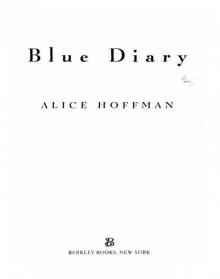 Blue Diary
Blue Diary The River King
The River King Here on Earth
Here on Earth Illumination Night: A Novel
Illumination Night: A Novel The Marriage of Opposites
The Marriage of Opposites Nightbird
Nightbird Incantation
Incantation Skylight Confessions
Skylight Confessions The Ice Queen
The Ice Queen Second Nature
Second Nature Fortune's Daughter: A Novel
Fortune's Daughter: A Novel Seventh Heaven
Seventh Heaven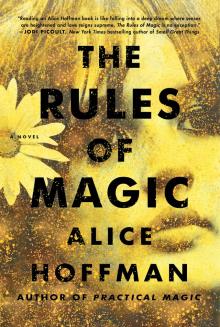 The Rules of Magic
The Rules of Magic The Red Garden
The Red Garden The Third Angel
The Third Angel White Horses
White Horses Property of / the Drowning Season / Fortune's Daughter / at Risk
Property of / the Drowning Season / Fortune's Daughter / at Risk Angel Landing
Angel Landing Magic Lessons
Magic Lessons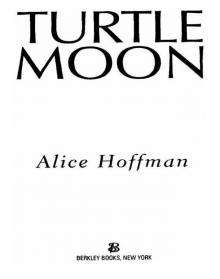 Turtle Moon
Turtle Moon Aquamarine
Aquamarine The World That We Knew
The World That We Knew Faithful
Faithful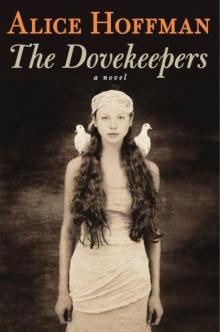 The Dovekeepers
The Dovekeepers The Foretelling
The Foretelling Green Angel
Green Angel At Risk
At Risk Green Heart
Green Heart Fortune's Daughter
Fortune's Daughter Faerie Knitting
Faerie Knitting Incantation (v5)
Incantation (v5) Green Witch
Green Witch Practical Magic
Practical Magic The Museum of Extraordinary Things
The Museum of Extraordinary Things The Probable Future
The Probable Future Illumination Night
Illumination Night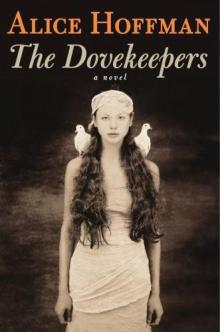 The Dovekeepers: A Novel
The Dovekeepers: A Novel Property Of, the Drowning Season, Fortune's Daughter, and At Risk
Property Of, the Drowning Season, Fortune's Daughter, and At Risk